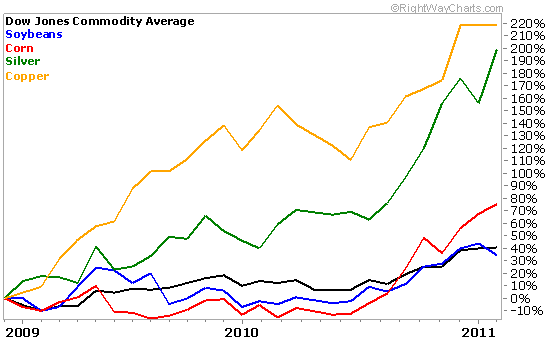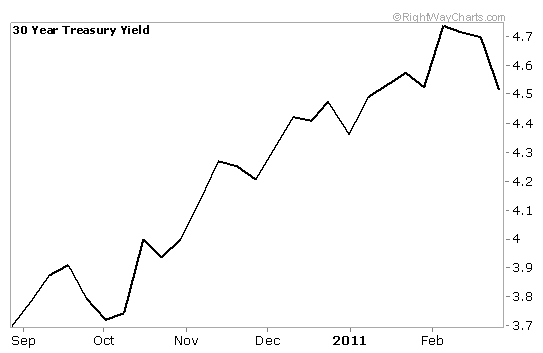I received an email this morning that sent me to a video/advertisement. I hate video advertisements! They take way too long to watch. So what I usually do is click on the "Close Window" tab and they then offer to let me "Stay on the current page" and read the transcript.
Yeah. So that's what I did.
And I've copied just a few of the more salient points for your benefit, here. (There's lots more. Lots of historical detail--about inflations from the Roman era to the present; about people's experiences from those times; about laws on the books or being projected (even by government officials; about current trends in the United
From Addison Wiggin of Agora Financial:
Many years ago, the United States lived well within its means...But what's around the corner? Wiggins asks.
Thomas Jefferson walked to and from his own inauguration ceremony — right down Pennsylvania Ave — and spoke to anyone who came up to him. [13]
But now when the U.S. president travels, he does so in imperial style...
When President Bush vacationed in Crawford, Texas, the flight on Air Force One alone cost nearly a quarter million dollars. And that didn't include the costs of the cargo planes that shuttled the president's limousines and helicopters... or the salaries of the hundreds of workers who laid the groundwork and organized the trip. [14] [15]
During President Obama's recent trip to India, it was rumored that he brought an entourage of 3,000... that he took with him 40 aircraft and six armored cars (one of which was equipped to even launch a nuclear missile... can you imagine what that car cost?)
Obama and his crew rented out 870 rooms in the five-star Taj Mahal. Political sites claimed that the trip cost the United States over $200 million per day. [16]
But as I'm sure you're aware, the executive branch isn’t the only one spending like crazy. Like a disease, this spree has spread to every branch of the government…
According to the most conservative numbers from the Bureau of Labor Statistics (BLS), the average federal worker is paid 20% more in salary than their private-sector equivalent. Add in the cost of benefits and the total federal employee’s salary boost is 50% over the private sector worker’s. [17]
One report recently revealed that half of the publicly funded Californian lifeguards are making more than $150,000. [18]
Lifeguards making $150,000? Out of taxpayer money? That’s out of control... wouldn’t you agree?
I've even read recent government audits that found...
The National Institute of Health will spend $2.6 million in U.S. tax dollars studying whether or not alcohol increases a Chinese prostitute's chance at getting AIDS... [19]This wasteful spending sounds made up, I know.
The National Science Foundation spent $500,000 studying how sick shrimp recover from treadmill exercise... [20]
The New York's Psychiatric Institute spent $400,000 of government grants studying why gay Argentinean men engage in risky sexual behavior while drunk... [21]
The government even spent $80,000 studying why the same NCAA basketball teams always dominate March Madness... [22]
But it's not. You can look it all up for yourself after this presentation... and you'll find that it's all 100% true.
Of course, these spending sprees and lavish salaries wouldn't be a problem if our government used its savings to pay for them.
But that’s the rub: The U.S. government has no savings.
Instead, we’ve relied on the savings of foreign nations... mainly places like China, Japan, India, and the Middle East... to pay for these things.
Until now, these "emerging" countries have been happy to lend us money. They're happy to take part in the “great American economic miracle.” . . .
[T]he government has spent so much money... we’ve racked up so many bills... we’ve dug a hole sooo deep...Wiggin goes on to offer at least some outlines of what he is doing in response to these looming and breaking crises. And, of course, he offers to sell you some newsletters.
There’s no possible way we could ever pay our lenders back.
Let me ask you: When you can't pay your bills, what happens?
It's only a matter of time before our credit card is finally shut off for good.
The rating agencies Standard & Poor's and Moody's, as well as the International Monetary Fund (IMF), have all issued warnings that they believe the day the U.S. government's credit card gets shut off is fast approaching. [24] [25] [26] [27]
Even David Walker, the former top accountant of the federal government, has gone on record warning that the U.S. government's credit could be cut off...
"You cannot spend trillions of dollars more than you take in… without someday having a day of reckoning," says Walker. [28] . . . .
In response to the Great Recession of 2008, the government used its “credit card” to borrow even more money to pay for all the stimulus and bailout programs you hear about in the news... putting us even DEEPER in the hole!
"Bank failures? No problem." Ka-ching!The U.S. government’s financial hole has been getting deeper by the trillions of dollars every year since 2008.
"Automakers going under? No problem." Ka-ching!
"Extended unemployment benefits? No problem." Ka-ching!
Let's look at one specific item the government’s been charging on its credit card: mortgage loans.
You may not know this, but in the past few years, the federal government has used its credit card to buy up 90% of all mortgage loans. [29]
The government’s goal is to keep mortgage interest rates well below free market rates. They believe this stimulates the housing market.
But what will happen to mortgage loans and home prices when the government can no longer buy mortgages with its own credit card?
Look around the world and you’ll find that mortgage rates are...
Once your government’s credit card is cut off — and they’re unable to fund the entire mortgage industry — mortgage rates will skyrocket.
- 30% higher in Canada…
- 42% higher in the U.K....
- 147% higher in Australia...
- 344% higher in India...
- 404% higher in Brazil... [30]
Imagine what would happen to the price of your home if mortgage rates doubled...
The housing market would crash yet again.
All that needs to happen to crush the housing market is for our foreign lenders to say, “America, you’ve spent too much... we know you will never be able to pay us back... so we’re cutting up your credit card.”
The reality is this...
The government's outstanding "credit card" bill is now more than the entire economic output of China, Japan and Germany — the next three largest economies in the world — combined! [31]
There’s not a snowball’s chance in hell that we will ever be able to pay this money back to our lenders. I say that with 100% confidence.
Consider this fact from the National Inflation Association (NIA):
America’s greatest business success story of the past decade has been Apple Inc. — maker of the iPod, the iPhone and the new iPad.Amazing, isn't it?
The U.S would need to see the creation of 700 companies like Apple in the next year just to generate enough tax revenue to balance [this year’s] budget deficit... that's impossible. [32]
Think we’ll create 700 new companies like Apple this year?
It took Steve Jobs, the founder of Apple, a lifetime to create the wealth he built in that company. It's not likely we can just wave a wand and create 700 more companies like that overnight.
But it's not really important what we think, is it?
It's only important what our lenders think. What happens if our lenders — mainly foreign nations — lose confidence in getting any of their money back? Or even getting a portion of it back?
After they finish being mad as hell, they'll stop lending to us. They'll cut off the credit card. They’ll look for better places around the world to park their own money.
Without that open-ended credit card… without being able to borrow more and more money… without our politicians being able to promise anything they want to get elected… the United States would look like a completely different place.
You know the feeling... standing at the register wondering if your credit card will go through. Wondering if you'll have to select a few items to put back on the shelves... all the while holding up the line.
The U.S. government is in the very same predicament... but the stakes are much higher.
All it would take for chaos to erupt is our creditors saying, “Enough is enough… we’re not lending you any more money.”
You may think this will never happen.
But the reality is that the cutoff process is already under way. Look around you. The consequences are easy to spot.
Consider this...
Throughout the property boom of the early 2000s, our state and local governments bet big that housing prices would continue going up. For them, higher home prices meant increased revenue from property taxes.
Based on those increased revenue projections, state and local governments expanded. They spent beyond their means.
When home prices crashed and foreclosures skyrocketed, the property tax revenue they so desperately needed to come in… never showed up. And they couldn’t “unspend” the money they had spent.
That’s why certain cities and states are now in deep financial trouble.
It’s also why the federal government used its credit card to send “stimulus” money directly to the state governments. The hope was to use Uncle Sam’s credit card to bail out the states and local governments.
With “stimulus” money, the states could continue to pay for more teachers... law enforcement officers... firemen... and other workers.
In total, 80% of the total stimulus money the feds borrowed went directly to the state governments. [33]
But now that “stimulus” money has run out. Now no one wants to lend these states money… because they know local governments can’t pay the money back.
And just this month, in a very similar "denial of credit," the United States Treasury itself cut off funding for state and city governments entirely. (The feds can’t afford to extend any more money. As we've shown you, their credit is already in danger!) [34]
So.... what we get is a real-life, in-your-face view of what America looks like without its credit card. Here’s a terrifying example…
* AMERICAN HELLHOLES — Camden, N.J., used to be the home to the entire Campbell's Soup factory. It was home to the world's first color television. They invented the "drive-in" movie theater. With almost full employment, innovation and massive manufacturing output, the mayor once proclaimed the place "the city of contented industries."
But just like what we’re seeing play out right now, they eventually got in over their heads…
The city's workers demanded more. They began to produce less. The politicians in Camden spent and promised too much.
And now lenders have shut off their credit card — giving them no choice but to cut services.
City leaders have been forced to lay off a quarter of the city workers — including nearly half of the police force and one-third of the firefighters. [35]
"The fear quotient has been raised," said Rev. Heyward Wiggins, pastor of the local church. His fellowship once held choir practice on Thursday and Friday evenings. Now he says he's cancelled those. Members are simply too afraid of being out after dark. [36]
Fellow Camden resident George Watson fears for his life... and home. He told the local news that "[Criminals will] be coming into the houses... they know you can’t call the cops. There won’t be any cops to call."
What’s happening in New Jersey is also happening in California...
After Oakland's police chief was forced to lay off his staff, he informed citizens that the police could no longer respond to various crime calls. Here are just a few things the police won’t show up for anymore…
Can you imagine being the victim of a robbery… and knowing the police won’t be there to answer your 911 call?
- Burglary…
- Theft…
- Failure to register as a sex offender…
- Passing fake checks…
- Embezzlement…
- Extortion…
- Vandalism
- And the list goes on… [37]
Then there’s this…
* POOR MAN'S PAVEMENT — In Spiritwood, N.D., they've run out of money for road paving. So they've begun the process of ripping up roads that need repair... and turning them back into gravel.
Sounds unbelievable, I know. But here's what The Wall Street Journal reported:
Paved roads, historical emblems of American achievement, are being torn up across rural America and replaced with gravel or other rough surfaces as counties struggle with tight budgets and dwindling state and federal revenue. State money for local roads was cut in many places amid budget shortfalls...Residents have complained of cracked windshields. They now cough up the dirt stirred up by traffic driving on gravel roads. And they worry about how the lack of roads will affect their businesses.
In Michigan, at least 38 of the 83 counties have converted some asphalt roads to gravel in recent years. Last year, South Dakota turned at least 100 miles of asphalt road surfaces to gravel. Counties in Alabama and Pennsylvania have begun downgrading asphalt roads to cheaper chip-and-seal road, also known as "poor man's pavement." Some counties in Ohio are simply letting roads erode to gravel. [38]
"When [counties] had lots of money," stated the local county highway superintendent, "they paved a lot of the roads and tried to make life easier for the people who lived out here. Now it's catching up to them."
Just think about that for a second...
Without access to Uncle Sam's credit card, some cities and states in America are already going back to gravel roads... back to the start of the 20th century. . . .
*******. . . Did you hear the nasty rumors flying around last year about the government seizing control of private 401(k)s? [57]
Financial researcher Jeff Schneider writes:
Americans have $4 trillion saved in 401(k) plans and another $8 trillion in IRAs and pension plans...As you see, the idea was that politicians would take control of your retirement accounts... and then forcefully loan your money to the government.
If the U.S. government forces investors to invest 50% of their IRAs in government bonds, that would raise $6 trillion. [58]
All in hopes to continue our consumption-driven way of life.
Whether or not this will happen is anyone’s guess. But here’s something that HAS been confirmed...
As I record this presentation for you. Treasury Secretary Geithner has announced that he will start tapping into federal pensions to borrow money for the government. [59]
When times get tight, governments have a history of seizing control of retirement accounts and savings accounts and controlling money flow in and out of the country.
Most people don’t remember this, but in 1982, the Mexican economy was suffering through its worst recession in over 60 years.
Unemployment was running at 40%. Massive money printing resulted in the prices of goods and services going up by 100% in just five months.
“Everything is so high,” said Trinidad Angeles, a widow living in Mexico during this time, “I can’t afford anything anymore. Even the price of water has doubled.”
When Mexicans began trying to trade in worthless pesos for other currencies, the Mexican government promptly outlawed the trading.
Here’s the report from a local paper, the Sept. 11, 1982, edition of The Evening Independent:
In a surprise move Friday, the Commerce Department announced Mexicans will not be allowed to take pesos from the country...The same thing that happened in Mexico during a currency crisis also happened in Malaysia, Venezuela, Russia... and other countries.
The controls, expected to curtail trading in the peso on the international market, are an attempt to maintain the artificially high value of the currency set by the government last week.
The announcement… also included a long list of silver and gold items, jewelry and gems that cannot be taken from Mexico without government authorization. [60]
For you, of course, it doesn’t matter what happened in other places. What matters most is the answer to this question: Will it happen here?
No one can say for sure. But I suggest you don’t wait around for a “surprise”...
I can't comment on the quality of the newsletters. I do think he may have some insights--even in his advertisement/presentation--that could be of benefit.
I hope you find it so, anyway.



![Reblog this post [with Zemanta]](http://img.zemanta.com/reblog_e.png?x-id=e1048586-3b96-42f1-9112-ef8339b3427e)

